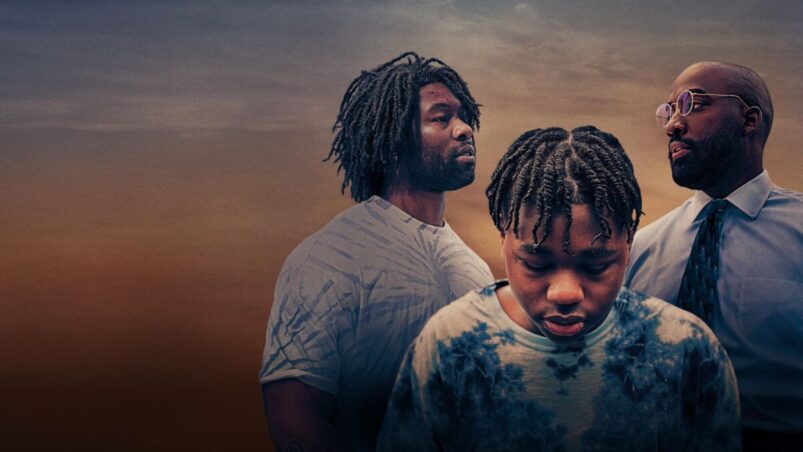The first image of Bruiser, the feature directorial debut of filmmaker Miles Warren, is mysterious, ominous, and almost mystical. In a 4:3 aspect ratio, we see the bodies of three black men lying on dark, maybe wet grass as an ominous score builds, then the smallest of them (and the only one with a shirt on) gets up and looks at the other two. It’s a beautiful and unsettling opening that sets the tone for the strikingly shot and deeply felt family drama that follows.
Bruiser centers on young teen Darious (Jalyn Hall) as he returns home for the summer from boarding school. Home is far from the city where many of his school friends live and doesn’t offer much in the way of entertainment. What he does have is an old bike that’s barely big enough for him to use, but still good enough for his distant father Malcolm (Shamier Anderson) to refuse to buy him a better one.
Darious rides around and meets up with local kids who he only sort of gets along with, and ends up getting into a fight with one of them. It’s after escaping this potentially escalating situation that he first meets Porter (Trevante Rhodes, giving a phenomenal performance). Porter is big, not tall, big. His broad shoulders and bulging muscles are the first thing anyone will notice about him, but he’s one of those big guys whose kindness and sweetness immediately curb any concern that this man might be dangerous. That kindness and emotional honesty attracts Darious.
Over the course of the film, Darious develops a relationship with Porter that he could never develop with his emotionally unavailable father. But things are complicated when Porter and Darious’s parents reveal that they have a past connection. Soon the film morphs into a story of Porter and Malcolm’s rivalry, in which Darious is the most valuable piece, while Darious’s mother Monica (Shinelle Azoroh) does her best to keep the peace.
Through their rivalry and their shifting relationships to Darious, the film explores black men’s relationships to anger, violence, responsibility, and their children. Bruiser is full of ideas and emotions, and it would be an effective film if it had only those ideas and emotions to offer, but Warren and cinematographer Justin Derry push the film beyond a standard drama with their astounding images.
The film is gorgeously shot from the start. There’s a light strip in Darious’s room that continuously changes colors, dowsing his deep green walls in various hues. The exteriors make the most of natural light glinting off water and shining through dense woods. A nighttime sequence at an outdoor fair is especially dazzling.
But the filmmaking flourishes don’t stop at making this tale of black masculinity utterly beautiful, as Warren uses the cinematic language of horror movies to draw out the suspense of violence bubbling under the surface. Robert Ouyang Rusli’s somehow simultaneously delicate and discordant score undergirds that sense of dread while also emphasizing the moments of sweetness we see throughout the film.
Sadly, though, Bruiser can’t escape its worst impulses, and instead of building up to a modern classic about black masculinity, it becomes a somewhat rote melodrama in its final half hour. There are repeated public blowouts and (undeniably unnerving) uses of parallel editing that move along the film’s rush towards a climax that feel too obvious for a movie that is wonderfully unique in its first hour. Bruiser is absolutely worth seeking out, but it likely won’t be a film that we’re talking about in a decade.
READ NEXT: Ranking M. Night Shyamalan’s Movies From Worst to Best
Some of the coverage you find on Cultured Vultures contains affiliate links, which provide us with small commissions based on purchases made from visiting our site.


